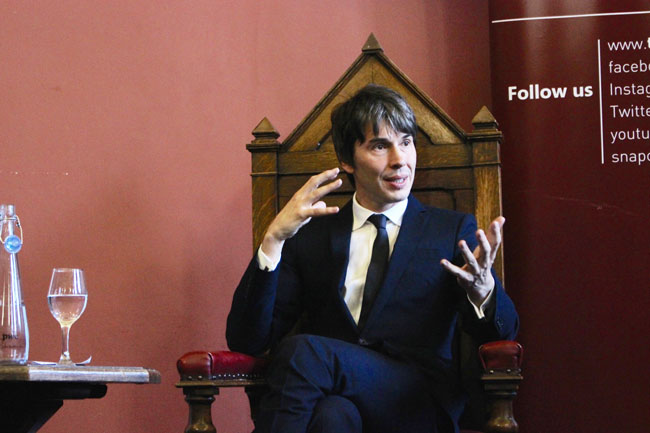
This afternoon, Prof Brian Cox visited the University Philosophical Society (the Phil) to accept the Gold Medal of Honorary Patronage award from the society. Cox is best known to the public as the presenter of science programmes, especially the Wonders of… series and for popular science books, such as Why Does E=mc²? and The Quantum Universe. He has been the author or co-author of over 950 scientific publications.
Cox was awarded the medal by the President of the Phil, Matthew Nuding. Cox said it was a great honor to find himself amongst such an impressive list of recipients, which include the likes of US Vice-President, Joe Biden; Apple CEO, Tim Cook; and, most recently, British filmmaker David Yates.
Upon approaching the Graduates Memorial Building (GMB) at 1.10pm I was met by a long line stretching back to the East Chapel. It came as no surprise that Cox’s visit would be one of the most anticipated by Trinity’s students. Cox entered the packed chambers to a boisterous applause. He accepted the award and proceeded to make a thought-provoking speech that referenced President of Ireland, Michael D Higgins, and reinforced the notion of “democratizing knowledge”. Pulling out his iPhone and declaring he was probably one of the first guests to have read from an iPhone to make a speech, Cox referred to Trinity as an institution that was essential in carrying the torch through a climate of anti-intellectualism saying “institutions like this are here for times like these”.
Nuding thanked Cox for his insightful speech and proceeded to ask a number of topical questions himself before opening the floor to guests, the first of which addressing Brexit and what it means for science. Cox suggested that the main issue is Britain’s image, how “the country is being perceived worldwide’’ as “suspicious of experts”. He believes the rhetoric is more damaging than the reality. Nuding followed this up with yet another on-trend question, asking Cox what he thinks about climate change deniers, referencing Cox’s recent debate with Australian Senator Malcolm Roberts on national television. Cox said that he believed the solution to the issue of climate change conspiracies is education and being taught to think analytically. He suggested we must deal with the mindset of the conspiracists. He also joked that some conspiracists say “Nasa gives me one thousands pounds a year!”.
Nuding then opened the floor to a Q&A session. One audience member asked what the greatest achievement by humans was before proceeding to ask Cox to sign his book, a question that received an almighty cheer from the room as Cox happily obliged. He then suggested that the greatest achievement was the Hadron Collider, the world’s largest and most powerful particle accelerator.
When asked about how to make science more accessible, Cox referred to democratising knowledge once again, stating that the way science is taught in primary and second-level schools is imperative to making science more accessible. He also mentioned the BBC and noted how lucky Britain is to have an institution that acts in the interest of the people.
The final question dealt with the role of religion in science. Cox said that a career in science is possible if you believe in a religion, but that there must be balance. He referred specifically to cosmologists and their ability to both hold religious beliefs and work in the scientific field.
Finishing up, there was a sense of disappointment that we did not have longer with Cox. His soft-spoken manner, ability to articulate himself so brilliantly and the fascinating content of the topics covered made his talk one of the most enjoyable and enlightening to attend.






